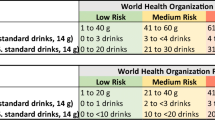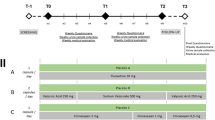Abstract
The pharmacological properties of baclofen, a GABAB receptor agonist, have led to investigation of its use for the off-label treatment of alcohol dependence. Literature examining the role of baclofen in alcohol dependence suggests that it may be a useful medication in the treatment armamentarium with an additional benefit of promoting abstinence and reducing alcohol-associated cravings and anxiety. We conducted a systematic review of prospective, randomized controlled trials comparing baclofen with placebo for the treatment of alcohol dependence. Four randomized controlled trials were identified but only three met criteria for inclusion. The excluded trial was a post hoc analysis of data collected from an original trial whose primary outcome did not fit our inclusion criteria and was terminated prior to completion. Compared with placebo, subjects randomized to baclofen experienced higher rates of abstinence and lower anxiety scores; the effect of baclofen was statistically significant in two trials assessing patients with more severe alcohol dependence and non-significant in a trial of outpatients receiving concomitant manualized psychotherapy. Baclofen appeared to be safe, well tolerated and to have low addiction liability even in the setting of moderate-to-severe liver cirrhosis, a known complication of alcohol dependence. Though baclofen may hold promise, the different outcomes and sample populations of the three studies highlight the need for more research to better understand the appropriate target patient population to benefit from this medication. Questions still remain about optimal dosing and duration. There is not enough evidence to support the use of baclofen as a first-line treatment option, except for those alcohol-dependent patients with moderate-to-severe liver cirrhosis in whom other pharmacological treatments are not safe or practical.


Similar content being viewed by others
References
Rehm J, Mathers C, Popova S, et al. Global burden of disease and injury and economic cost attributable to alcohol use and alcohol-use disorder. Lancet 2009; 373: 2223–33
Hasin DS, Stinson FS, Ogburn E, et al. Prevalence, correlates, disability, and comorbidity of DSM-IV alcohol abuse and dependence in the United States. Arch Gen Psychiatry 2007; 64: 830–42
Rehm J, Baliunas D, Guilherme B, et al. The relation between different dimensions of alcohol consumption and burden of disease: an overview. Addiction 2010; 105: 817–43
Rehm J, Taylor B, Mohapatra S, et al. Alcohol as a risk factor for liver cirrhosis: a systematic review and meta-analysis. Drug Alcohol Rev 2010; 29: 437–45
Swift R. Emerging approaches to managing alcohol dependence. Am J Health Syst Pharm 2007; 64(5 Suppl. 3): S12–22
Mann K. Pharmacotherapy of alcohol dependence: a review of clinical data. CNS Drugs 2004; 18: 485–504
Garbutt JC, West SL, Carey TS, et al. Pharmacological treatment of alcohol dependence: a review of the evidence. JAMA 1999; 281: 1318–25
Rosner S, Hackl-Herrwerth A, Leucht S, et al. Acamprosate for alcohol dependence. Cochrane Database Syst Rev 2010; (9): CD004332
Rosner S, Hackl-Herrwerth A, Leucht S, et al. Opioid antagonists for alcohol dependence. Cochrane Database Syst Rev 2010; 12: CD001867
Anton RF, O’Malley SS, Ciraulo DA, et al. Combined pharmacotherapies and behavioral interventions for alcohol dependence: the COMBINE study. A randomized controlled trial. JAMA 2006; 295: 2003–17
Baltieri DA, Daro FR, Ribeiro PL, et al. Comparing topiramate with naltrexone in the treatment of alcohol dependence. Addiction 2008; 103: 2035–44
Johnson BA, Rosenthal N, Capece JA, et al. Topiramate for treating alcohol dependence: a randomized controlled trial. JAMA 2007; 298: 1641–51
Johnson BA, Ait-Daoud N, Akhtar FZ, et al. Oral topiramate reduces the consequences of drinking and improves the quality of life of alcohol-dependent individuals: a randomized controlled trial. Arch Gen Psychiatry 2004; 61: 905–12
Johnson BA, Ait-Daoud N, Bowden CL, et al. Oral topiramate for treatment of alcohol dependence: a randomized controlled trial. Lancet 2003; 361: 1677–85
Caputo F, Addolorato G, Stoppo M, et al. Comparing and combining gamma-hydroxybutric acid (GHB) and naltrexone in maintaining abstinence from alcohol: an open randomized comparative study. Eur Neuropsychopharmacol 2007; 17: 781–9
Caputo F, Addolorato G, Lorenzini F, et al. Gamma-hydroxybutric acid versus naltrexone in maintaining alcohol abstinence: an open randomized comparative study. Drug Alcohol Depend 2003; 71: 85–91
Gallimberti L, Ferri M, Ferrara SD, et al. Gamma-hydroxybutric acid in the treatment of alcohol dependence: a double-blind study. Alcohol Clin Exp Res 1992; 16: 673–6
Addolorato G, Caputo F, Capristo E, et al. Ability of baclofen in reducing alcohol craving and intake: II. Preliminary clinical evidence. Alcohol Clin Exp Res 2000; 24: 67–71
Flannery BA, Garbutt JC, Cody MW, et al. Baclofen for alcohol dependence: a preliminary open-label study. Alcohol Clin Exp Res 2004; 28: 1517–23
Addolorato G, Caputo F, Capristo E, et al. Baclofen efficacy in reducing alcohol craving and intake: a preliminary double-blind randomized controlled study. Alcohol Alcohol 2002; 37: 504–8
Addolorato G, Leggio L, Ferrulli A, et al. Effectiveness and safety of baclofen for maintenance of alcohol abstinence in alcohol-dependent patients with liver cirrhosis: randomized, double-blind controlled study. Lancet 2007; 370: 1915–22
Garbutt JC, Kampov-Polevoy AB, Gallop R, et al. Efficacy and safety of baclofen for alcohol dependence: a randomized, double-blind, placebo-controlled trial. Alcohol Clin Exp Res 2010; 34: 1–9
Addolorato G, Leggio L, Ferrulli A, et al. Dose-response effect of baclofen in reducing daily alcohol intake in alcohol dependence: secondary analysis of a randomized, double-blind, placebo-controlled trial. Alcohol Alcohol 2011; 46: 312–7
Colombo G, Addolorato G, Agabio R, et al. Role of GABAB receptor in alcohol dependence: reducing effect of baclofen on alcohol intake and alcohol motivational properties in rats and amelioration of alcohol withdrawal syndrome and alcohol craving in human alcoholics. Neurotox Res 2004; 6: 403–14
Addolorato G, Leggio L, Cardone S, et al. Role of the GABAB receptor system in alcoholism and stress: focus on clinical studies and treatment perspectives. Alcohol 2009; 43: 559–63
Krystal JH, Tabakoff B. Ethanol abuse, dependence, and withdrawal: neurobiology and clinical implications. In: Davis KL, Charney D, Coyle JT, et al., editors. Neuropsychopharmacology: 5th generation of progress. New York (NY): Lippincott Williams and Wilkins; 2002: 1425–43
Sinha R, Fox HC, Hong KA, et al. Enhanced negative emotion and alcohol craving, and altered physiological responses following stress and cue exposure in alcohol dependent individuals. Neuropsychopharmacology 2009; 34: 1198–208
Sinha R, Li CS. Imaging stress- and cue-inducing and alcohol craving: association with relapse and clinical implications. Drug Alcohol Rev 2007; 26: 25–31
American Psychiatric Association. Diagnostic and statistical manual of mental disorders. 4th ed., text revision. Washington, DC: American Psychiatric Association, 2000
Jadad AR, Moore RA, Carrol D, et al. Assessing the quality of reports of randomized clinical trials: is blinding necessary? Controlled Clin Trials 1996; 17: 1–12
Starosta AN, Leeman RF, Volpicelli JR. The BRENDA model: integrating psychosocial treatment and pharmacotherapy for the treatment of alcohol use disorders. J Psychiatr Pract 2006; 2: 80–9
Ameisen O. Complete and prolonged suppression of symptoms and consequences of alcohol-dependence using high-dose baclofen: a self-case report of a physician. Alcohol Alcohol 2005; 40: 147–50
Bucknam W. Suppression of symptoms of alcohol dependence and craving using high-dose baclofen. Alcohol Alcohol 2007; 42: 158–60
Agabio R, Marras P, Addolorato G, et al. Baclofen suppresses alcohol intake and craving for alcohol in a schizophrenic alcohol-dependent patient: a case report. J Clin Psychopharm 2007; 27: 319–20
Gerkin R, Curry SC, Vance MV, et al. First-order elimination kinetics following baclofen overdose. Ann Emerg Med 1986; 15: 843–6
VanDierendonk DR, Dire DJ. Baclofen and ethanol ingestion: a case report. J Emerg Med 1999; 17: 989–93
Chen KS, Bullard MJ, Chien YY, et al. Baclofen toxicity in patients with severely impaired renal function. Ann Pharmacother 1997; 31: 1315–20
Vivitrol® [package insert]. Waltharn (MA): Alkermes, Inc., 2010
Amini M, Runyon BA. Alcoholic hepatitis 2010: a clinician’s guide to diagnosis and therapy. World J Gastroenterol 2010; 16: 4905–12
Evans SM, Bisaga A. Acute interaction of baclofen in combination with alcohol in heavy social drinkers. Alcohol Clin Exp Res 2009; 33: 19–30
Addolorato G, Leggio L. Safety and efficacy of baclofen in the treatment of alcohol-dependent patients. Curr Pharm Des 2010; 16: 2113–7
Krupitsky EM, Burakov AM, Ivanov VB, et al. Baclofen administration for the treatment of affective disorders in alcoholic patients. Drug Alcohol Depend 1993; 33: 157–63
Franklin TR, Harper D, Kampman K, et al. The GABA B agonist baclofen reduces cigarette consumptions in a preliminary double-blind placebo-controlled smoking reduction study. Drug Alcohol Depend 2009; 103: 30–6
Karilla L, Gorelick D, Weinstein A, et al. New treatment for cocaine dependence: a focused review. Int J Neuropsychopharmacol 2008; 11: 425–38
Keena GA, Nielsen DM, Mello P, et al. Pharmacotherapy of dual substance abuse and dependence. CNS Drugs 2007; 21:213–37
Heinzerlin KG, Shoptaw S, Peck JA, et al. Randomized, placebo-controlled trial of baclofen and gabapentin for the treatment of methamphetamine dependence. Drug Alcohol Depend 2006; 85: 177–84
Rose ME, Grant JE. Pharmacotherapy for methamphetamine dependence: a review of the pathophysiology of methamphetamine addiction and the theoretical basis and efficacy of pharmacotherapeutic interventions. Ann Clin Psychiatry 2008; 20: 145–55
US National Institutes of Health. ClinicalTrials.gov [online]. Available from URL: http://clinicaltrials.gov [Accessed 2011 Apr 25]
Acknowledgements
No financial support was received for this publication. The authors of this paper have no sources of financial support or any conflicts of interest relevant to this publication. This paper (in part or in whole) has not been previously presented or published.
Author information
Authors and Affiliations
Corresponding author
Rights and permissions
About this article
Cite this article
Muzyk, A.J., Rivelli, S.K. & Gagliardi, J.P. Defining the Role of Baclofen for the Treatment of Alcohol Dependence. CNS Drugs 26, 69–78 (2012). https://doi.org/10.2165/11597320-000000000-00000
Published:
Issue Date:
DOI: https://doi.org/10.2165/11597320-000000000-00000




